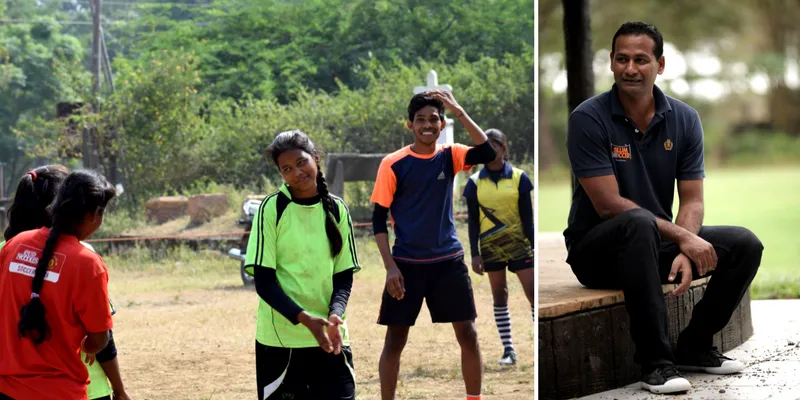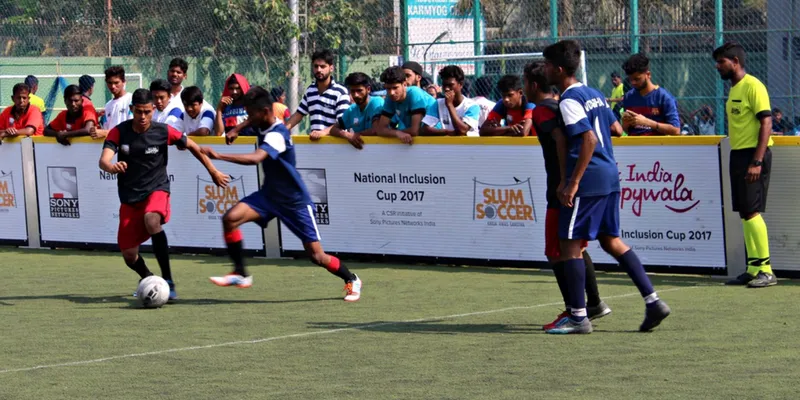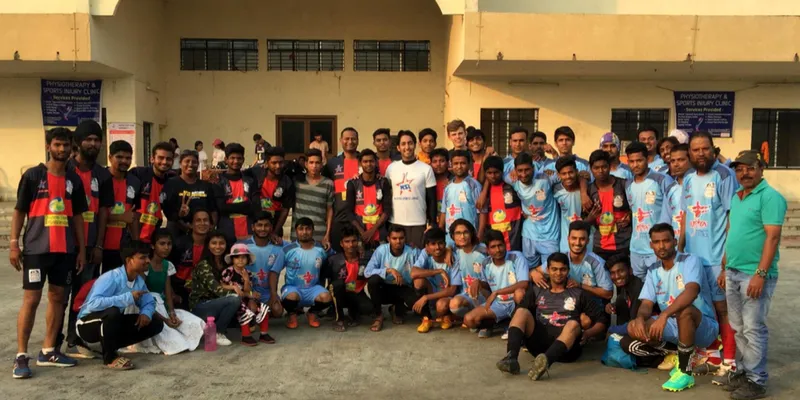How a retired sports teacher changed the lives of 50,000 slum children with football
Slum Soccer has been offering much needed sporting opportunities and personal development programmes to disadvantaged youth across the country.

Reena Panchal was captain for the India women’s team at Homeless Soccer World Cup held in Amsterdam in 2015. Her passion and skill earned her the award for Best Female Player in the tournament to her team’s delight. But not so long ago Reena couldn’t dream of getting out of the confines of her house, let alone representing a football team.
Reena comes from the State of Haryana where girls playing football is frowned upon, and for a very long time, she was forced to hide her love for the game.
But, despite the circumstances she faced at home and outside, she persisted; she participated in the national championship in 2014 and went on the represent India in the 2015 Homeless World Cup.
This was possible because of Slum Soccer, a Nagpur-based organisation that is determined to get children like Reena out there into the world.
Slum Soccer
Slum Soccer was founded in 2001 by Vijay Barse, a retired sports teacher in Nagpur. Vijay’s primary influence in starting the initiative was when he coached a few children in the nearby slums to play football.

He observed that these children would gather every weekend just for the love of football. He coached about a dozen kids in the neighbouring playground and was able to see how these kids came together to learn a new sport.
He could see that the children liked having a purpose and were only too happy to find someone who could guide them. This was when he realised that football could be the means to transform the children living in the slum.
Zopadpatti football, as it was dubbed in its initial days, aimed at bringing in youngsters from underprivileged and difficult backgrounds such as drug abuse, anti-social activities, poverty, social alienation, and personal struggles.
India, the second most populous nation in the world, has a population of well over a billion people. About 170 million of these people live on the streets with no place to call home and account for 17 percent of the world’s entire slum-dwelling population.

The Indian government has been able to do little to tackle the problem of homelessness. This is where Slum Soccer strives to make a difference by reaching out to the Indian homeless using football as a tool for social improvement and empowerment.
“We are using sports as a tool for social change,” says Abhijeet Barse, Vijay’s son and current CEO of Slum Soccer. He took over the initiative from his father in 2007.
Today, Slum Soccer has seven programmes and has had an impact on nearly 70,000 children across six states in the country, in the past 10 years.
What started as a simple weekend session coaching initiative is now an organisation with fledged football coaching camps, educational and healthcare workshops.
Societal development programmes is bringing a positive influence among men, women and children in over 63 districts around the country.
Challenges and going ahead
Talking about the challenges in creating Slum Soccer, Abhijeet says,
The major challenge that we have had to face was in terms of how people perceive sports. We are often told that children will be better off spending time studying in the classroom rather than playing on the field.
"This comes from all people working in all spheres of life, the teachers, parents, and even the sponsors. But we have proved, time and again, about the positive impact of sports in the lives of children. Today, a number of people who we have worked with are now programme managers and work closely with me," he adds.
Among the seven programmes of the organisation are the coaches training programmes, livelihood training programme, health camps and young leaders programme.
The coached training programme makes sure most of the coached were once participants, as Slum Soccer believes in ‘development from within.’ In addition to training them to be a good coach they also focus on imparting leadership skills, which calls for ‘Youth Leadership Program’, which identifies potential leaders and trains them in various skills so they can grow to take up higher roles in the organisation.
The programmes talk about everything from life skills to child rights, hygiene and sanitation. It’s possible to do this in a fun way through soccer. If I want to talk about gender, all I do is get the girls and boys to play together, says Abhijeet.

The livelihood programme addresses the employment problems of the players, choosing who are eligible for a specific paid position that is available in one of the nearby industries or an organisation and training them on the skills that are relevant for the job.
Slum Soccer also gives special focus on education through its project Edukick, which focuses on the promotion of primary education for the children from the underprivileged section of the society. Also, part of the agenda of Slum Soccer is the development of women football.
The project ‘Women Football Development’ is currently underway at three of the centres to ensure participation of women in the sport.
Impact
Through the various programmes, Slum Soccer was able to ensure the participation of children hailing from slums, in competitions such as the National Inclusion Cup, where 400 participated.
The Zopadpatti Central Tournament, conducted at Nagpur, saw the participation of nearly 1,200 kids from across the country and the Gamesa Soccer League had 420 children participated.
Slum Soccer trained 16 children to represent India at the Homeless World Cup.
Today, Slum Soccer is reaching out to at least 500 children annually, enrolling youth from urban slums into programmes that ensure physical activity, nutrition, education, and mentorship in football. Slum Soccer aims to reach out to at least 700 more children each year, and in 50 more cities and hopes to produces more coaches and mentors in the coming year.







